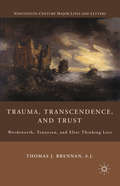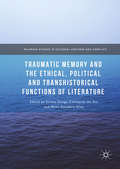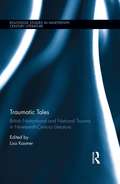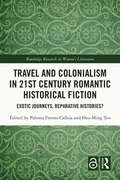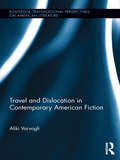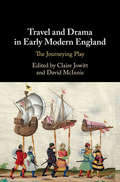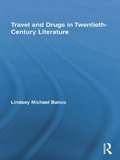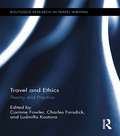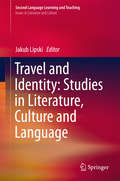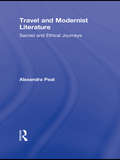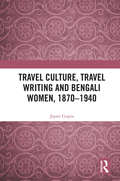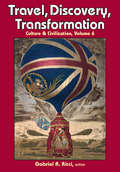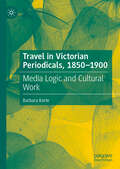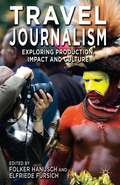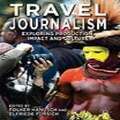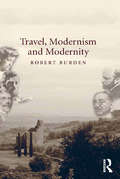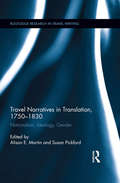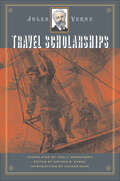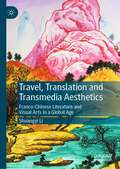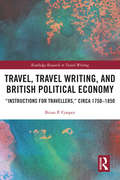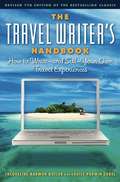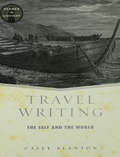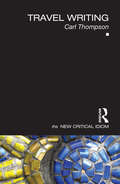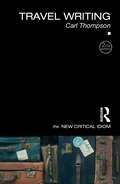- Table View
- List View
Trauma, Transcendence, and Trust
by Thomas J. Brennan S. J.Thomas Brennan finds roots of the 'sensibility of trauma' by returning to the work of Wordsworth, Tennyson, and Eliot. By reading these poets of mourning through the framework of trauma, Brennan reflects on our traumatized moment and weighs two potential responses - the fantasy of transcendence and the ethic of trust.
Traumatic Memory and the Ethical, Political and Transhistorical Functions of Literature
by Susana Onega Constanza Del Río Maite Escudero-AlíasThis volume addresses the construction and artistic representation of traumatic memories in the contemporary Western world from a variety of inter- and trans-disciplinarity critical approaches and perspectives, ranging from the cultural, political, historical, and ideological to the ethical and aesthetic, and distinguishing between individual, collective, and cultural traumas. The chapters introduce complementary concepts from diverse thinkers including Cathy Caruth, Jacques Derrida, Judith Butler, Homi Bhabha, Abraham and Torok, and Joyce Carol Oates; they also draw from fields of study such as Memory Studies, Theory of Affects, Narrative and Genre Theory, and Cultural Studies. Traumatic Memory and the Political, Economic, and Transhistorical Functions of Literature addresses trauma as a culturally embedded phenomenon and deconstructs the idea of trauma as universal, transhistorical, and abstract.
Traumatic Tales: British Nationhood and National Trauma in Nineteenth-Century Literature (Routledge Studies in Nineteenth Century Literature)
by Lisa KasmerTraumatic Tales: British Nationhood and National Trauma in Nineteenth-Century Literature explores intersections of nationalism and trauma in Romantic and Victorian literature from the emergence of British nationalism through the height of the British Empire. From the national tales of the early nineteenth century to the socially incisive realist novels that emerged later in the century, nationalism is inescapable in this literature, as much current scholarship acknowledges. Nineteenth-century national trauma, however, has only recently begun to be explored. Taking as its starting point the unsettling effects of nationalism, the essays in this collection expose the violence underlying empire-building, particularly in regard to subject identity. National violence—imperialism, colonialism and warfare—necessarily grounds nation-formation in deep-lying trauma. As the essays demonstrate, such fraught nexus are made visible in national tales as well as in political policy, exposed by means of theoretical and historical analyses to reveal psychological, political, social and individual trauma. This exploration of violence in the construction of national ideology in nineteenth-century Britain rethinks our understanding of cultural memory, national identity, imperialism, and colonialism, recent thrusts of Romantic and Victorian study in nineteenth-century literature.
Travel and Colonialism in 21st Century Romantic Historical Fiction: Exotic Journeys, Reparative Histories? (Routledge Research in Women's Literature)
by Paloma Fresno-Calleja Hsu-Ming TeoRomantic fiction has often involved stories of travel. In narratives of the journey towards love, "romance" often involves encounters with "exotic" places and peoples. When history is invoked in such stories, the past itself is exoticised and treated as "other" to the present to serve the purposes of romanticisation: a narrative strategy by which all manner of things – settings, characters, costumes, customs, consumables – are made to perform a luxuriant otherness that amplifies the experience of love. This volume questions the reparative function of Anglophone romantic historical fiction to ask: can plots of travel and discourses of tourism empower women while narrating stories of healing for the wounds of the past? This is the first volume to consider how romanticised and exoticised women’s historical fiction not only serves the purposes of armchair travel but may also replicate colonial discourse, unintentionally positioning readers as neocolonial, neo-Orientalist cultural voyeurs as well as voyagers.
Travel and Dislocation in Contemporary American Fiction (Routledge Transnational Perspectives on American Literature)
by Aliki VarvogliThis book offers a critical study and analysis of American fiction at the beginning of the twenty-first century. It focuses on novels that ‘go outward’ literally and metaphorically, and it concentrates on narratives that take place mainly away from the US’s geographical borders. Varvogli draws on current theories of travel globalization and post-national studies, and proposes a dynamic model that will enable scholars to approach contemporary American fiction and assess recent changes and continuities. Concentrating on work by Philip Caputo, Dave Eggers, Norman Rush and Russell Banks, the book proposes that American literature’s engagement with Africa has shifted and needs to be approached using new methodologies. Novels by Amy Tan, Garrison Keillor, Jonathan Safran Foer and Dave Eggers are examined in the context of travel and globalization, and works by Chang-rae Lee, Ethan Canin, Dinaw Mengestu and Jhumpa Lahiri are used as examples of the changing face of the American immigrant novel, and the changing meaning of national belonging.
Travel and Drama in Early Modern England: The Journeying Play (Early Modern Literature in History)
by Claire Jowitt David McInnisThis agenda-setting volume on travel and drama in early modern England provides new insights into Renaissance stage practice, performance history, and theatre's transnational exchanges. It advances our understanding of theatre history, drama's generic conventions, and what constitutes plays about travel at a time when the professional theatre was rapidly developing and England was attempting to announce its presence within a global economy. Recent critical studies have shown that the reach of early modern travel was global in scope, and its cultural consequences more important than narratives that are dominated by the Atlantic world suggest. This collection of essays by world-leading scholars redefines the field by expanding the canon of recognized plays concerned with travel. Re-assessing the parameters of the genre, the chapters offer fresh perspectives on how these plays communicated with their audiences and readers.
Travel and Drugs in Twentieth-Century Literature (Routledge Studies in Twentieth-Century Literature #11)
by Lindsey Michael BancoThis book examines the connections between two disparate yet persistently bound thematics -- mobility and intoxication -- and explores their central yet frequently misunderstood role in constructing subjectivity following the 1960s. Emerging from profound mid-twentieth-century changes in how drugs and travel were imagined, the conceptual nexus discussed sheds new light on British and North American responses to sixties counterculture. With readings of Aldous Huxley, William Burroughs, Alex Garland, Hunter S. Thompson, and Robert Sedlack, Banco traces twin arguments, looking at the ways travel is imagined as a disciplinary force acting upon the creative, destabilizing powers of psychedelic intoxication; and exploring the ways drugs help construct travel spaces and practices as, at times, revolutionary, and at other times, neo-colonial. By following a sequence of shifting understandings of drug and travel orthodoxies, this book traverses fraught and irresistibly linked terrains from the late 1950s up to a period marked by international, postmodern tourism. As such, it helps illuminate a world where tourism is continually expanding yet constantly circumscribed, and where illegal drugs are both increasingly unregulated in the global economy and perceived more and more as crucial agents in the construction of human subjectivity.
Travel and Ethics: Theory and Practice (Routledge Research in Travel Writing)
by Charles Forsdick Corinne Fowler Ludmilla KostovaDespite the recent increase in scholarly activity regarding travel writing and the accompanying proliferation of publications relating to the form, its ethical dimensions have yet to be theorized with sufficient rigour. Drawing from the disciplines of anthropology, linguistics, literary studies and modern languages, the contributors in this volume apply themselves to a number of key theoretical questions pertaining to travel writing and ethics, ranging from travel-as-commoditization to encounters with minority languages under threat. Taken collectively, the essays assess key critical legacies from parallel disciplines to the debate so far, such as anthropological theory and postcolonial criticism. Also considered, and of equal significance, are the ethical implications of the form’s parallel genres of writing, such as ethnography and journalism. As some of the contributors argue, innovations in these genres have important implications for the act of theorizing travel writing itself and the mode and spirit in which it continues to be conducted. In the light of such innovations, how might ethical theory maintain its critical edge?
Travel and Identity: Studies in Literature, Culture and Language (Second Language Learning and Teaching)
by Jakub LipskiThis book presents a selection of research papers dealing with the notions of travel and identity in Anglophone literature and culture. Collectively, the chapters ponder such notions as self and other, race, centre and periphery, thus shedding new light on a number of issues that are highly relevant in the context of the ongoing migration crisis. The contributors employ a diverse range of theoretical standpoints – from close reading to deconstruction, from historically informed approaches to linguistic analysis – and thus offer a nuanced panorama of these issues, especially from the nineteenth century onwards.
Travel and Modernist Literature: Sacred and Ethical Journeys (Routledge Studies In Twentieth-century Literature Ser. #15)
by Alexandra PeatThrough close readings of works from Henry James to W. E. B. Du Bois, and from Virginia Woolf to Jean Rhys, this book discusses how fictional travelers negotiate and adapt various tropes of travel (such as quest, expatriation, displacement, and exile) as models for their own journeys. Specifically, Peat considers the ethical dimensions of modernist travel from two distinct vantages. The first focuses on the relationship between the secular and the sacred in modernist travel literature, arguing that the recurrent narrative of secular travel is haunted by a desire for spiritual transcendence. The second posits modernist travel fiction as a potentially positive example of transcultural relations, consciously arguing against the received notion that travel during an imperial era is always by nature itself imperialist. Throughout, particular attention is paid to the transnational nature of modernism and the various global flows traced by modernist literature.
Travel Culture, Travel Writing and Bengali Women, 1870–1940
by Jayati GuptaThis book chronicles travel writings of Bengali women in colonial India and explores the intersections of power, indigeneity, and the representations of the ‘self’ and the ‘other’ in these writings. It documents the transgressive histories of these women who stepped out to create emancipatory identities for themselves. The book brings together a selection of travelogues from various Bengali women and their journeys to the West, the Aryavarta, and Japan. These writings challenge stereotypes of the 'circumscribed native woman’ and explore the complex personal and socio-political histories of women in colonial India. Reading these from a feminist, postcolonial perspective, the volume highlights how these women from different castes, class and ages confront the changing realities of their lives in colonial India in the backdrop of the independence movement and the second world war. The author draws attention to the personal histories of these women, which informed their views on education, womanhood, marriage, female autonomy, family, and politics in the late 19th and early 20th centuries. Engaging and insightful, this volume will be of interest to students and researchers of literature and history, gender and culture studies, and for general readers interested in women and travel writing.
Travel, Discovery, Transformation (Culture And Civilization Ser.)
by Gabriel R. RicciThis latest volume in the Culture & Civilization series gathers interdisciplinary voices to present a collection of essays on travel and travel narratives. The essays span a range of topics from iconic ancient travel stories to modern tourism. They discuss travel in the ancient world, modern heroic travels, the literary culture of missionary travel, the intersection of fiction and travel narratives, modern literary traditions and visions of Greece, personal identity, and expatriation. Essays also address travel memoirs, the re-imagining of worlds through travel, transformed landscapes and animals in travel narratives, diplomacy, English women travel writers, and pilgrimage and health in the medieval world.The history of travel writing takes in multiple pursuits: exploration and conquest, religious pilgrimage and missionary work, educational tourism and diplomacy, scientific and personal discovery, and natural history and oral history. As a literary genre, it has enhanced a wide range of disciplines, including geography, ethnography, anthropology, and linguistics. Moreover, twenty-first-century interests in travel and travel writing have produced a global framework that promises to expand travel's theoretical reach into the depths of the Internet, thus challenging our conventional concept of what it means to travel.The fact that travel and travel writing have a prehistory that is embedded in foundational religious texts and ancient narratives of journey, like the Odyssey and the Epic of Gilgamesh, makes both travel and travel writing fundamental and essential expressions of humanity. Travel encourages writing, particularly as epistolary and poetic chronicling. This is clearly a history and tradition that began with human communication and which has kept pace with our collective development.
Travel in Victorian Periodicals, 1850-1900: Media Logic and Cultural Work
by Barbara KorteThis is the first study to explore the connections between the development of travel and the rapid expansion of the periodicals market in the second half of the nineteenth century in Britain. By the 1860s, travel articles had become a staple of the periodicals market and reached readers who might never have travelled far themselves or bought a travel book. This monograph demonstrates that the representation of travel in Victorian periodicals came in forms and with cultural functions that differed from book publication, and that this media-specific representation helped to inscribe travel into the Victorian lifeworld. Based on a corpus of several general-interest periodicals targeted at different audiences, this book investigates how different readers - the family, women, young people and the working classes - engaged with travel. It argues that travel articles in periodicals performed significant cultural work because they accommodated readers to travel.
Travel Journalism: Exploring Production, Impact and Culture
by F. Hanusch E. FürsichContributors from diverse backgrounds explore a range of issues in relation to the media and journalism's role in ascribing meaning to tourism practices. This fascinating account offers a thoroughly international and interdisciplinary perspective on an increasingly important field of journalism scholarship.
Travel Journalism
by Folker Hanusch Elfriede FürsichTravel journalism has experienced enormous growth over recent decades, with a record number of media organizations now involved in producing information for tourists in one way or another. Correspondingly, journalism and media scholars have begun to pay more attention to this phenomenon. This book gives a comprehensive overview of the burgeoning field of travel journalism studies. The contributors explore travel journalism in newspapers and magazines, on television and online, across a wide range of national and cultural contexts. Individual chapters provide critical discussions of theoretical approaches, present studies of production, content and impact, and explain how travel journalism can be understood through the lenses of postcolonialism, sustainability and cosmopolitanism. This fascinating account offers a thoroughly international and interdisciplinary perspective on an increasingly important field of journalism scholarship.
Travel, Modernism and Modernity
by Robert BurdenFocusing on the significance of travel in Joseph Conrad, E.M. Forster, D.H. Lawrence, Henry James, and Edith Wharton, Robert Burden shows how travel enabled a new consciousness of mobility and borders during the modernist period. For these authors, Burden suggests, travel becomes a narrative paradigm and dominant trope by which they explore questions of identity and otherness related to deep-seated concerns with the crisis of national cultural identity. He pays particular attention to the important distinction between travel and tourism, at the same time that he attends to the slippage between seeing and sightseeing, between the local character and the stereotype, between art and kitsch, and between older and newer ways of storytelling in the representational crisis of modernism. Burden argues that the greater awareness of cultural difference that characterizes both the travel writing and fiction of these expatriate writers became a defining feature of literary modernism, resulting in a consciousness of cultural difference that challenged the ethnographic project of empire.
Travel Narrative and the Ends of Modernity
by Stacy BurtonOver the past century, narratives of travel changed in response to modernist and postmodernist literary innovation, world wars, the demise of European empires, and the effect of new technologies and media on travel experience. Yet existing critical studies have not examined fully how the genre changes or theorized why. This study investigates the evolution of Anglophone travel narrative from the 1920s to the present, addressing the work of canonical authors such as T. E. Lawrence, W. H. Auden, and Rebecca West; best-sellers by Peter Fleming and H. V. Morton; and texts by Colin Thubron, Andrew X. Pham, Rosemary Mahoney, and others. It argues that the genre's most important transformation lies in its reinvention as a means of narrating the subjective experience of violence, cultural upheaval, and decline. It will interest scholars and students of travel writing, modernism and postmodernism, English and American literature, and the history and sociology of travel.
Travel Narratives in Translation, 1750-1830: Nationalism, Ideology, Gender (Routledge Research in Travel Writing #6)
by Alison E. Martin Susan PickfordThis book examines how non-fictional travel accounts were rewritten, reshaped, and reoriented in translation between 1750 and 1850, a period that saw a sudden surge in the genre's popularity. It explores how these translations played a vital role in the transmission and circulation of knowledge about foreign peoples, lands, and customs in the Enlightenment and Romantic periods. The collection makes an important contribution to travel writing studies by looking beyond metaphors of mobility and cultural transfer to focus specifically on what happens to travelogues in translation. Chapters range from discussing essential differences between the original and translated text to relations between authors and translators, from intra-European narratives of Grand Tour travel to scientific voyages round the world, and from established male travellers and translators to their historically less visible female counterparts. Drawing on European travel writing in English, French, German, Spanish, and Portuguese, the book charts how travelogues were selected for translation; how they were reworked to acquire new aesthetic, political, or gendered identities; and how they sometimes acquired a radically different character and content to meet the needs and expectations of an emergent international readership. The contributors address aesthetic, political, and gendered aspects of travel writing in translation, drawing productively on other disciplines and research areas that encompass aesthetics, the history of science, literary geography, and the history of the book.
Travel Scholarships (Early Classics Of Science Fiction Ser.)
by Jules VerneNine students from London's Antillean School receive travel scholarships to visit their island homelands in the Caribbean. Accompanied by their eccentric Latin professor, they set sail on what they expect to be a thrilling educational voyage. Little do they realize that, prior to their arrival on board, their ship had been hijacked by escaped convicts who murdered its original captain and crew. This is the only novel by the legendary Jules Verne that has never been available in English until now. Although ostensibly written for an adolescent audience, its suspense-filled plot, sophisticated narrative style, and critique of European colonialism make it an engrossing read for all ages.
Travel, Translation and Transmedia Aesthetics: Franco-Chinese Literature and Visual Arts in a Global Age
by Shuangyi LiThis book examines the works of four contemporary first-generation Chinese migrant writer-artists in France: François CHENG, GAO Xingjian, DAI Sijie, and SHAN Sa. They were all born in China, moved to France in their adulthood to pursue their literary and artistic ambitions, and have enjoyed the highest French and Western institutional recognitions, from the Grand Prix de la Francophonie to the Nobel Prize in Literature. They have established themselves not only as writers, but also as translators, calligraphers, painters, playwrights, and filmmakers mainly in their host country. French has become their dominant—but not only—language of literary creation (except for Gao); yet, linguistic idioms, poetic imagery, and classical thought from Chinese cultural heritage permeate their French texts and visual artworks, reflecting a strong translingual and transmedial sensibility. The book provides not only distinctive literary and artistic examples beyond existing studies of intercultural encounter, French postcolonial, and Chinese diasporic enquiries; more importantly, it formulates a theoretical model that captures the creative dynamics between the French/francophone and Chinese/sinophone spaces of articulation, thereby contributing to contemporary debates about literary and artistic production, interpretation, and circulation in the global development of comparative/world literature, as well as intermediality studies.
Travel, Travel Writing, and British Political Economy: “Instructions for Travellers,” circa 1750–1850 (Routledge Research in Travel Writing)
by Brian P. CooperThe book draws on the history of economics, literary theory, and the history of science to explore how European travelers like Alexander von Humboldt and their readers, circa 1750–1850, adapted the work of British political economists, such as Adam Smith, to help organize their observations, and, in turn, how political economists used travelers’ observations in their own analyses. Cooper examines journals, letters, books, art, and critical reviews to cast in sharp relief questions raised about political economy by contemporaries over the status of facts and evidence, whether its principles admitted of universal application, and the determination of wealth, value, and happiness in different societies. Travelers citing T.R. Malthus’s population principle blurred the gendered boundaries between domestic economy and British political economy, as embodied in the idealized subjects: domestic woman and economic man. The book opens new realms in the histories of science in its analyses of debates about gender in social scientific observation: Maria Edgeworth, Maria Graham, and Harriet Martineau both observe a role associated with women and methodically interpret what they observe, an act reserved, in theory, by men.
The Travel Writer's Handbook
by Louise Purwin Zobel Jacqueline Harmon ButlerVeteran travel writer Jacqueline Harmon Butler shows readers, one step at a time, how to research, write, and sell travel articles--but most importantly, she details what makes a travel article a winner.In this new edition, Butler updates her bestselling handbook for the 21st century with helpful tips on conducting Internet research, utilizing new advancements in digital photography and finding helpful applications on mobile phones. She also helps aspiring writers navigate the changing world of publishing by exploring blogging, new travel websites, and social media, all while discussing how best to expand your platform.She includes a brand new introduction to reflect the current state of the travel industry and the change in editors' needs. Butler covers all the nuts and bolts aspects of travel writing from pre-trip research, specific marketing strategies, and even includes 12 formats for travel articles with sure-fire appeal to editors and readers. She gives insightful and often humorous advice on pre- and post-trip topics like: How to target your market before you begin How to save time by doing background research before you leave How to write queries and get assignments in advance How to find new angles for overworked subjects What to take along--from video equipment and laptops to travel documents How to set up and conduct successful interviews How to take advantage of freebies and junkets without "selling out" How to sell what you write--and then sell it again
Travel Writing (Genres In Context Ser.)
by Casey BlantonBlanton follows the development of travel writing from classical times to the present, focusing in particular on Anglo-American travel writing since the eighteenth century. He identifies significant theoretical and critical contributions to the field, and also examines key texts by James Boswell, Mary Kingsley, Graham Greene, Peter Mathiessen, V.S. Naipaul, and Bruce Chatwin.
Travel Writing: The New Critical Idiom (The New Critical Idiom)
by Carl ThompsonAn increasingly popular genre – addressing issues of empire, colonialism, post-colonialism, globalization, gender and politics – travel writing offers the reader a movement between the familiar and the unknown. In this volume, Carl Thompson: introduces the genre, outlining competing definitions and key debates provides a broad historical survey from the medieval period to the present day explores the autobiographical dimensions of the form looks at both men and women’s travel writing, surveying a range of canonical and more marginal works, drawn from both the colonial and postcolonial era utilises both British and American travelogues to consider the genre's role in shaping the history of both nations. Concise and practical, Travel Writing is the ideal introduction for those new to the subject, as well as a crucial overview of current debates in the field.
Travel Writing (The New Critical Idiom)
by Carl ThompsonThe new edition of Travel Writing is an accessible and interdisciplinary guide to this prolific and popular literary genre. Carl Thompson offers a clear and concise overview of the long history of travel writing from the ancient world to the present day.Considering a wide range of primary sources from Sir Walter Raleigh to Jenny Diski, the extensively updated second edition: introduces the genre and outlines key debates within the field, such as gender, sexuality, postcolonial studies, and visual culture; explores the genre’s autobiographical dimensions and different approaches for depicting the self; surveys a range of canonical and more marginal works, featuring new discussion of refugee and migrant narratives and LGBTQ travel writing; includes a new chapter walking readers through the developments in the genre since the first edition, such as online forms, environmentalism and ecocriticism, and travel writing as an increasingly transnational, multicultural genre. With a comprehensive glossary and further reading, Travel Writing, Second Edition is an ideal primer to the genre for students – bridging the gap between distant times and distant places – as well as offering literary studies scholars an essential overview of current debates in the field.
